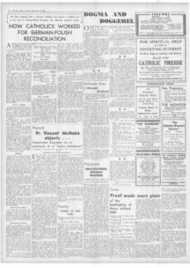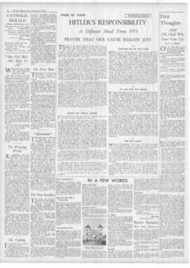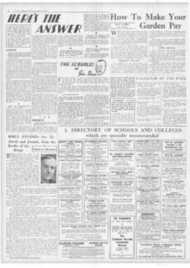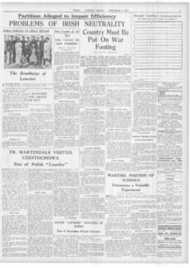Page 9, 8th September 1939
Page 9

Report an error
Noticed an error on this page?If you've noticed an error in this article please click here to report it.
Tags
Share
Related articles
Solution A United Ireland
" Horrible, But Not Impossible " Catastrophe Of New...
Jap War Affects Eire
De Valera's Reply
Irish News Letter Eire . Decides What Is Propaganda
Partition Alleged to Impair Efficiency
PROBLEMS OF IRISH NEUTRALITY Country Must Be Put On War Footing
From Our Own Correspondent Dueux.
WTILL IRELAND, AFTER HER SEVEN CENTURIES OF STRIFE, NEVER KNOWING FREEDOM OR PEACE FOR MORE THAN A FEW YEARS, ENJOY A DIFFERENT FORTUNE NOW, AND BECOME, AS SHE WAS IN THE DARK AGES, THE QUIET REFUGE OF SANCTITY AND LEARNING, WHILE GREATER EUROPE IS RAVAGED?
This question suggested itself on Sunday, when bulletin after bulletin on the English radio told of the running out of the ultimatum, the declaration of war, peril, and fear and wrath; and we turned the button for Radio Eireann, and behold— The cool voice of a preacher, raised in the great new cathedral of Christ the King at Mullingar ; a voice that we last heard preaching to a million people at the Eucharistic Congress of 1932—an archbishop, home from America to his native land, now preaching again in those golden tones.
We were present in spirit in that magnificent temple that stands high over the plains of Meath, wherein
prayer and contemplation went on, while, at a turn of the button, we might hear the direful tidings of war and war and Will'.
Policy of Neutrality
Or. Saturday there had been an urgent meeting of Dail and Senate, and Mr De Valera had announced the Irish Government's policy of neutrality.
The German Minister had called on him, he said, on the last day of August, to assure him that Germany would respect Irish neutrality.
Mr De Valera spoke of the difficulty that would attend the Irish course.
Of all nations, Ireland had best reason to know what it was for the weak to be attacked by the strong, to be oppressed and partitioned; but she must look to her own vital interests, especially while part of her territory was held from her.
Mr Dillon, deputising for Mr Cosgrave, and Mr Norton, the leader of Labour, supported the Government. The former wished it to be put on record where his sympathies lay in the European conflict, but he called for unanimity behind the national policy. In the Senate, Mr MacDermot and Sir John Keane, Baronet, spoke in the same strain as Mr Dillon.
Constitution Amended An amendment of the Constitution was hurried into law, empowering the Government to declare that a state of war existed, even if Ireland was neutral.
Thi point es that the country must be put on a war footing, and lawyers thought that the Constitution, without this amendment, made it impossible to do this without war in which Ireland is directly involved. Another piece of lightning legislation gave the Government full war-time powers.
Powerful Censorship
Our first taste of the new powers was the erection of a censorship and restrictions on travel-much on the same lines as in England.
These measures are vital to neutrality; for it is manifest that Irish prints and radio, and the movement of persons in and out of Ireland, well might affect the interests of one or other combatant if not controlled strictly.
We are likely to be controlled even more strictly than if we were at war; for Ireland's Government recognises that Ireland's security rests on her giving absolutely no aid, direct or indirect, material or otherwise, to an attacking Power.
No One May Leave
No one can leave Ireland now without permit, and no one can enter without equivalent credentials. This makes it impossible for Ireland to become a clearing-house for aliens or a refuge to persons evading their obligations.
There is, at the time of writing, free movement across the internal Border, and movement in or out of Ireland by the Northern ports is under British control. This diviaion of control must impair efficiency.
England cannot make the internal Border water-tight without using an army almost as big as that needed on the Maginot line-for the Border is equally long. Hence her effective border is at the Ulster ports, and Partition merely involves her in entanglements that profit her nothing.
The news that neither the new Conscription, nor all the war-time restrictions imposed by London are to apply to the Six Counties suggests the hope that the British Government may be coming to the decision to hand over control of all Ireland to a single authority, and so profit England by establishing, as it were, a secure western bastion of neutral territory. One hopes and prays that this may come to pass.
English Children Arrive
Meanwhile, thousands of children from England are coming to Ireland, as if the vast migration that I suggested last week were going to come to pass. One thinks of the colleges of Ireland to which students came from England it the Dark Ages, as St. Bede tells, when he writes of the hospitality that they received, and the free education at Armagh and elsewhere. Will it be that Ireland may take a sweet revenge on England, after the centuries, by giving her children refuge, happiness in a green land, and Christian schools?
German Minister Remains
As I write, nothing is known of the Intentions of the German Embassy in Dublin. AS Ireland is not at war, will the Minister remain? If so, must his credentials be transferred to the President of Ireland? These delicate constitutional questions must be faced this week.
One hopes that an arrangement may be made by which the Minister will remain, as he would in any other neutral country, for this reason: that the savagery of war might be mollified if there were even this tenuous contact between the warring Powers, so near to the scene of conflict. Might not Ireland, whose people have strong sympathies indeed, not all on one side, but whose Government is solely pacific and compassionate, be a link to draw the shattered Western world together?
Cabinet Changes
On Sunday night Mr De Valera gave a broadcast, in which he explained the Government's policy and aims and announced Cabinet changes. Mr Frank Aiken will co-ordinate civil and military defence, and Mr Oscar Traynor will go to the Ministry of Defence. Mr Lemass
will take over supplies, and will be re
placed in Industry by Mr O'Deirg. In turn, Mr O'Deirg's office of education will be taken over by Mr Sean T. O'Kelly.
Closing his broadcast, the Taoiseach said: "Although, as I have said, we are not engaged in this terrible war, it cannot fail to bring us severe hard ships. But there is no reason why we should be unduly anxious. As long as the people are of one mind in regard to the national policy to be pursued, we shall surmount all our difficulties. United and disciplined, we have nothing to fear.
" The nation that has survived centulles of suffering has no need to fear or be daunted. I ask every citizen to accept loyally and to obey any directions which officers of the State are
authorised to give them. If that is done, and each one goes about his
ordinary work, and does it a little better than he did it before, he will be making his biggest contribution to our efforts in the present circumstances.
" Before concluding, I would like, on behalf of the Government and our people as a whole, to offer our profound sympathy to all the men and women of all the nations in this period of trial and suffering that is before them."
Mr De Valera ended by invoking in Gaelic the blessing of God and Muire Mdthair-the loving Irish name of Mary
the Mother.
Catholic Russian Group
Issues News-sheet
The Cambridge Summer School Bussian Group has issued the first number of a news-sheet which will be devoted to the doings of those working for the conversion of Russians both in and out of the Soviet Union.
The first number contains news from the missions to the Russians in Finland, Lithuania, Esthonia, Belgium, and Shanghai. It is announced that Fr. John Tryder, S.J., who was chiefly responsible for organising the Russian Summer School at Cambridge, is going to Los Angeles to start a mission for the Russian colony there.
School isIncluded givenin the at e wt heeSUAinniPr:r°1S8Choof
sheet.
Those interested in the Russian Group or the news-sheet should write to: The Editor, 1, Buckingham Palace Gardens, London, S.W.1.
blog comments powered by Disqus













